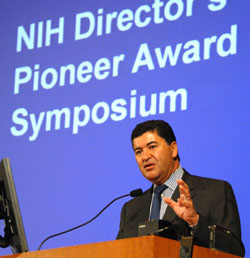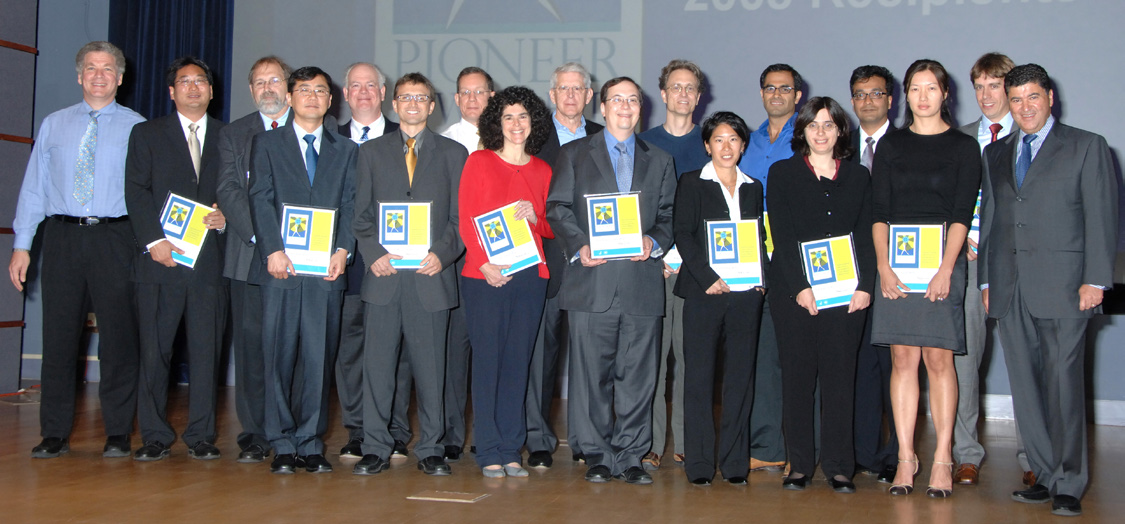| |
 |
|
|
|
|
| |
NIH director Dr. Elias Zerhouni |
|
As the 2-day award symposium got under way in Natcher auditorium, one attendee remarked to another, “They give you all this money and you have to go to one meeting a year—what’s not to like?”
The fourth annual symposium was extended this year from one day to two. “That’s because the winners in past years told us that they enjoy interacting with one another so much,” Zerhouni
explained. “What I hope will happen is that interconnections will develop between all of you. Cross-fertilization across bright minds is the key to progress in science. Please don’t be shy—talk among yourselves and challenge one another.”
After announcing this year’s winners, Zerhouni
gave the keynote address on “Future Trends in Biomedical Science.” Knowing that he was on the verge of announcing his plans to step down as director just 2 days later, Zerhouni asked the audience to indulge him in a flight of speculation
about how science—and civilization—advance.
Tool-making, he said, leads to new knowledge. The ability to measure accurately at different scales “is why scientific progress occurs…accurate
measurements do change your perspective on reality.”
He described the “S-curve of science, which applies to all fields,” which begins with empirical
observations followed by a reductionist phase (what are the components?) then a data explosion in the bend of the letter, as we gain “a growing understanding of subsystems. In biology
this would include immune response, cell signaling and apoptosis, for example.” The curve is completed—in a cycle typically taking 150 years—as the partial theories that arise from the data explosion mature toward unifying
theories.
Where are we now along the S? Zerhouni and many audience members (some of whom, preoccupied
with their new awards, undoubtedly drew a line through the S to get a $) place biomedical
knowledge in the “information explosion”
phase. As evidence he showed how discoveries
from genome-wide association studies have grown from a few to a flood in only 3 years. Pioneer awardees alone have published 356 scientific papers in the past 4 years, he said.
 |
| Zerhouni (r) and NIGMS director Dr. Jeremy Berg (l) flank the 2008 class of Pioneer Award winners. They are (from l) Drs. James K. Chen, James Eberwine, Hongkun Park, Joshua Epstein, Ricardo Dolmetsch, Charles Lieber, Ann Hochschild, Tom Maniatis, Barry London, Bruce Hay, Teri Odom, Saeed Tavazoie, Aviv Regev, Aravinthan Samuel, Alice Ting and Alexander van Oudenaarden. |
“The work in front of us is to understand the biology behind all of these clues,” Zerhouni said. “It’s like drinking from a fire hydrant.”
He concluded with some advice: “The best way to ensure failure is to try and ensure success…Don’t be afraid of failure or bad ideas. Give it a try, take the risk…Resistance to new knowledge
is a constant…The greatest risk in science is to stop taking risks”…and finally, “Don’t be a me-too, that’s not the way to succeed. Go for it—let’s ride!”
Each Pioneer Award provides $2.5 million in direct costs over 5 years. New Innovator Awards are for $1.5 million in direct costs over the same time period. Both programs are part of the NIH Roadmap for Medical Research.
For a list of the 16 Pioneer awardees, visit http://nihroadmap.nih.gov/pioneer/Recipients08.
aspx. To learn more about the 31 Innovator
awardees, visit http://grants.nih.gov/grants/new_investigators/innovator_award/fy2008_awards.htm. 